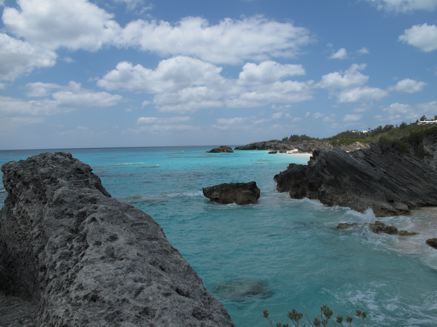Bermuda Diving Guide: Graham Maddock Interview
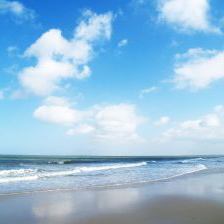 Ever wondered why Bermuda is known as the wreck diving capital
Ever wondered why Bermuda is known as the wreck diving capitalof the Atlantic?
Peter sat down with Graham Maddock, a lifelong Bermudan diver and owner of Triangle Diving about
what exists under the seas, where it came from, and the conservation measures
being taken to protect local sea life.
Peter Greenberg: For
those people who might be intimidated about going underwater the good news is
the water is not that deep here. You can really see a lot in a short amount of
time.
Graham Maddock: You
hit the nail on the head. Most of the recreational diving here in Bermuda is in
maximum depth of 60 feet. But we’ve also got the third deepest oceans in the
world just off Bermuda.
PG: Plus, you’ve got
some great wreck diving.
GM: Phenomenal wreck
diving.
PG: Which means they
couldn’t find Bermuda until Bermuda found them.
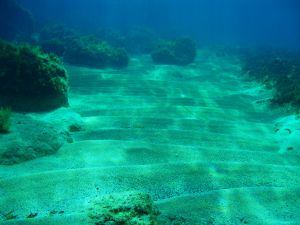 GM: Well,
GM: Well,
that’s why we have so many wrecks. We’ve got 280 square miles of coral reef here
surrounded by a wall of barrier reef. And in the 1600s and 1700s they didn’t
have radar, GPS, etc.
PG: Hey, even if you
do have radar and GPS, if you don’t know the waters you’re going to run aground.
GM: That just
happened just a couple of summers ago. A sailboat was coming in, it had radar
and GPS, and it still managed to run into the reef.
PG: And what
happened to him?
GM: It sank and we
did the recovery on it.
PG: And what
happened to that boat?
GM: It was a
write-off. You don’t run into the reef here in Bermuda without a lot of damage.
PG: So what would
you say is the coolest wreck that you can dive here?
GM: Wow, man, it
really depends. There is nowhere else in the world where you have wrecks from
the 1500s all the way up to the 1940. My most favorite wreck is on the eastern
side of the island. It’s call the Iristo and it even has some fire engines on
top.
PG: It has fire
engines on top?
GM: Yeah, fire
engines, and a steam roller. It has a beautiful A-frame steam engine, which is
quite rare. It sits in about 50 feet of water, but it’s untouched. You’re
talking about coral that is absolutely pristine.
Find more watery adventures in our Water Sports section.
PG: Let’s talk about
that. I don’t hear a lot about coral that is untouched because we are seeing the
disintegration of so many great coral reefs around the world.
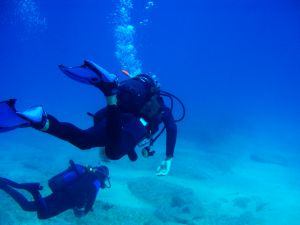 GM: It is really sad. I’ve dived all over
GM: It is really sad. I’ve dived all over
the Atlantic and people always say, “Where is your favorite spot?” It’s got to
be Bermuda. I mean we have 98 percent coral reef coverage. A lot of tourists
come out in the boat and say, “We never even heard Bermuda had diving.” It is
the best-kept secret in the Atlantic. The coral out here is stunning.
PG: Well the reason
why it’s the best-kept secret in Atlanta is because people don’t know it’s in
the Atlantic.
GM: Yeah, that is
very true.
PG: Now I have to
ask the Johnny Depp question: What about buried treasure and pirates?
GM: It’s out there
for sure; it has not all been found yet. Some of the largest treasures ever to
be found are probably here in Bermuda.
PG: But nobody has
really gotten a lot of treasure here lately, have they?
GM: No, they
haven’t. And there are certain laws that stop people from looking or require
them to hand it in if they do find it.
Relax near the ocean, visit our Beach Vacations section.
 PG: OK,
PG: OK,
wait Graham, if you found it, would you hand it in?
GM: Probably not.
PG: Thank you very
much.
GM: There are some
great stories that go with it. Back in the 1600s and 1700s, they used Bermuda as
a landmark. Once they came up the Gulf Stream and once they found Bermuda they
would turn right and head back to Spain. And a lot of times they would zig
instead of zag, and end up on our reefs here. The maps weren’t very accurate
back then.
PG: Well, people
were doing star fixes; they were just celestial navigating.
GM: They didn’t know
latitude and longitude, so a lot of times they were guessing. I mean they were
amazingly accurate for what rudimentary navigational skills they had. But they
often made mistakes and they ended up wrecked here.
PG: What are the
most surprising wrecks, other than the fire engines on the top of the deck?
Find out what else is unique about Bermuda with the Ask the Locals Travel Guide: Bermuda
GM: There is a wreck
called the Cristobol Colon that is the largest shipwreck in
Bermuda. It was a luxury cruise liner. It had no passengers when it wrecked, but
it had a 113-person crew. And it smashed into the reef doing 50 knots.
GM: Once they did
the investigation they found out the crew really weren’t crew, but might have
been people running away from a revolution down in Puerto Rico. That ended up
with them being put in prison, and some of them were executed when they got back
to Spain.
PG: Wow, so that
wasn’t exactly The Love Boat.
GM: No, it wasn’t The Love Boat. But it had a
really neat story behind it.
PG: Now of all the
wrecks, what about naval ships though as opposed to just passenger ships or
freighters?
GM: During World War
II we did have a few ships that ran into the reef. They were carrying iron ore.
Most of the big shipwrecks are on the eastern side of the island.
PG: What about ships
that were torpedoed during WWII?
GM: No, those were
all in deep water and well off Bermuda.
PG: Any submarines?
GM: Yes there is one
off the Western end, but it is in deep water, more than 2,000 feet.
Check out more guests from Peter’s radio show from Bermuda’s Fairmont Southampton.
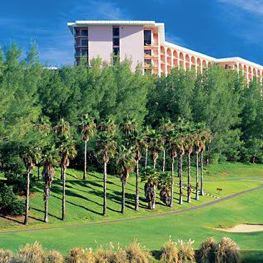 PG: So
PG: So
nobody is going down there.
GM: Yeah that’s the
problem. It’s either quite shallow here in Bermuda, or real, real deep. My dive
team is beginning to explore the deeper water around the island and trying to
find some of the wrecks. We’re beginning to explore one right now that we know
exists. We’re not too far from finding it now.
PG: Do you use
deep-sea submersibles?
GM: No, we use our
Optima Rebreathers from Dive Rite. We dive Rebreathers on helium, and we’re
going to go all the way around the island on these very large underwater
military sleds to survey all the water around the island at 200 feet, and see
what’s down there. The other thing we’re trying to do is also discover hotspots
and breeding areas for lionfish.
PG: You were saying
to me things have gotten better in that department.
GM: Well, back in
the old days we had these big wire cages called fish pots. The fish could swim
in and couldn’t swim out. As the population of Bermuda grew, they began to wipe
out our fish docks here. Thank goodness a lady named Ann Cartwright-DeCouto made
them illegal and saved our fish population. Since then our fish population has
come roaring back. You’ve got to remember we’re the second most remote populated
island in the world. So some of the fish species we have here are completely
genetically unique to Bermuda, such as the black grouper. Our black grouper
genetic code doesn’t exist in any other black grouper DNA anywhere else in the
world. We’ve been studying those for four years. Now we have a problem with the
lionfish that have been introduced to the Atlantic artificially.
Find earth-friendly travel options in our Eco-Travel section.
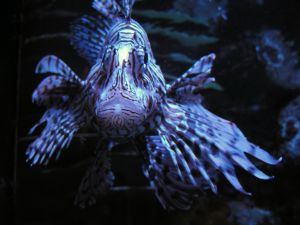 PG: And
PG: And
they’re a predator.
GM: They’re a
predator. Some people get confused. They ask me, why don’t you just leave them
alone? They’re so beautiful. Here’s the problem: They’re not meant to be here in
the Atlantic. What we did as an experiment, we took our Bermuda bream, which is
another endemic fish to Bermuda, and we put them in a tank with the black
grouper, and …
PG: And they ate
them all.
GM: No, they swam
right to the other side of the tank. They knew to stay away from that black
grouper. We put them in the tank with the lionfish; they swam right to the
lionfish and got eaten. They don’t know, it is not in their DNA, it is not in
their genes to know to stay away from lionfish.
PG: OK, stupid
question about the lionfish. You’re not catching them to eat them are you?
GM: Oh yes, they’re
really tasty. And the unique thing is that they’re sushi grade too. So we’re
hoping they are going to catch on as sushi-grade meat. As they kill off all the
blue tuna, we hope that people will start.
Explore Bermuda culture with Grateful Traveler: Bermuda Takes In Couple For Art Residency.
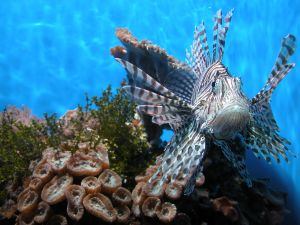 PG: So
PG: So
you’ve got to get some fish pots back just for the lionfish.
GM: Yeah, and that
is what we’re hoping to do. It will all be very controlled by the environmental
protection people and us. We’ll set them in these particular hot spots that we
find at deep depths, catch a large amount of them, and hopefully start selling
them commercially as another food source.
PG: I hope you do
that because you can’t lose those other species.
GM: Nope. They are
ferocious eaters. Lionfish will actually eat themselves to death, and they grow
much bigger in the Atlantic. The Atlantic record is 18 inches for a lionfish.
PG: I have friends
of mine like that.
To listen to the entire interview, click on the Play button on the homepage
of PeterGreenberg.com. Or sign up to be an Insider to get on-demand access to
the podcast. The first month is free!
Related links on PeterGreenberg.com:










